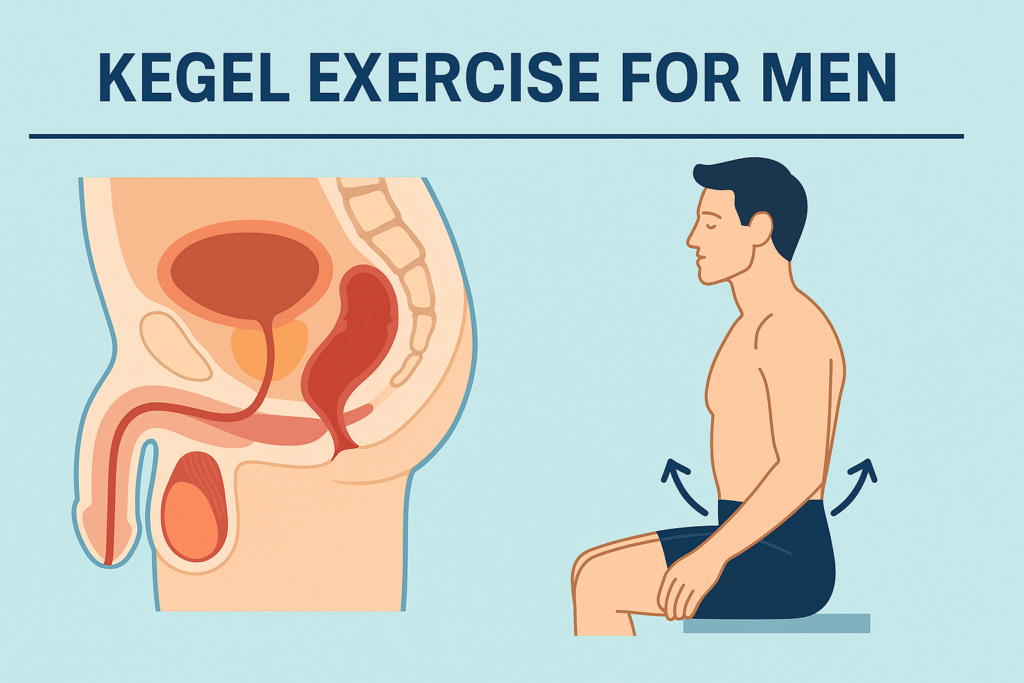Kegel exercises—beloved by women for postpartum recovery—are equally powerful for men. These quick, portable pelvic floor contractions offer benefits reaching far beyond simply preventing “leaky” situations. They support better urinary control, prostate health, and sexual performance. With minimal effort, you can make meaningful gains in daily life—and even supercharge your intimate life.
This guide dives deep into the what, why, and how of male Kegels, blending medical insight with practical advice. We’ll touch upon anatomy, techniques, schedules, advanced variations, and precautions. Plus, you’ll find external sources to learn more and validate these claims.

1. Understanding the Pelvic Floor and Kegels
What Are Pelvic Floor Muscles?
Your pelvic floor is a hammock-like layer of muscles running from the pubic bone (front) to the tailbone (back), supporting the bladder, prostate, and bowel.
Key muscles include:
- Pubococcygeus (PC): essential for bladder and semen control
- Bulbocavernosus & ischiocavernosus: involved in erection and ejaculation
What Are Kegel Exercises?
Kegels are controlled contractions of these muscles—tighten, hold, then release. They function similarly to bicep curls—but for your pelvic floor .
The action supports the urethra, bladder, and prostate, making them vital for multiple health aspects.
2. Why Men Benefit from Kegels
A. Improved Urinary Control
Age, heavy lifting, chronic cough, constipation, and prostate surgery all weaken pelvic floor muscles. The result? Urinary leakage, dribbling, and urgency.
Research by Mayo Clinic, Cleveland Clinic, and Healthline confirms that consistent Kegels significantly reduce incontinence and urge issues.
B. Faster Post–Prostate Surgery Recovery
Following prostatectomy, weakening of urinary control is common. Kegels help restore sphincter strength, speeding up continence recovery (often within 9–12 months) .
UCLA Health and Cleveland Clinic recommend starting before surgery to prime muscles and continuing afterward for best results.
C. Better Sexual Performance
Regular pelvic floor training enhances erection quality, erection angle, and stamina. It may even help manage premature ejaculation.
Data cited by GQ, Health.com, and Dr. Kelepurovski show that around 40% of men can significantly reduce erectile dysfunction and premature ejaculation within months of consistent Kegel training.
D. Prostate Support & Reduced Symptoms
Kegels are shown to improve prostate issues like prostatitis and BPH (benign prostate enlargement). They aid by increasing blood flow, reducing tension, and improving neural regulation
A 2024 trial even showed that Kegels combined with alpha-blockers reduced urinary symptoms more effectively than medication alone
E. Other Benefits
- Fecal incontinence reduction
- Core stability: Kegels complement core & back strength
- Chronic pelvic pain relief through myofascial tension release
3. Locating & Isolating the Right Muscles
Finding Your Pelvic Floor
- Stop urine midstream: Note which muscles activate.
- Squeeze as if holding in gas.
- Insert a clean finger into the anus and gently contract
These exercises help you identify and isolate the pelvic floor without engaging abs, buttocks, or thighs
Avoid Common Mistakes
- Don’t hold your breath
- Don’t use adjacent muscle groups
- Don’t overtrain (too much can cause tension)
4. How to Do Kegels: Step-by-Step
Basic Routine
- Pick your position: start lying down, then seated, then standing
- Contract & hold: squeeze for 3–5 sec; relax 3–5 sec
- Reps & sets: 10–15 reps per set, 3–4 sets a day
- Daily frequency: at least three times daily, spread out
Advanced Training (after 4–6 weeks)
- Long holds: up to 10 seconds
- Quick flicks: rapid contractions to build reflex
- Bridges & wall squats with pelvic engagement
Sample Workout
| Session | Exercise | Hold | Reps | Notes |
|---|---|---|---|---|
| 1 (lying) | Basic squeeze | 5 sec | 15 reps | Focus on isolation |
| 2 (sitting) | Long holds | 10 sec | 10 reps | Work on endurance |
| 3 (standing) | Quick flicks | 1 sec | 20 reps | Build reflex response |
Add bridges, wall squats, or lunges 2–3×/week for extra pelvic chance .
5. Kegels for Prostate Health
Men with BPH or prostatitis benefit from combining Kegels with medical treatment People+15nuvectramedical.com+15bensnaturalhealth.com+15. The exercises help:
- Reduce inflammation
- Improve blood flow and drainage
- Alleviate nerve-related pelvic pain
For guidance, check out Dr. Ilija Kelepurovski’s prostate exercise guide bensnaturalhealth.com.
6. Expectations: When Will You See Results?
Timeline Overview
- 3–6 weeks: noticeable improvement in control & endurance
- 6–12 weeks: reduction in leakage & strengthened erections
- 3 months+: prostate pain relief, solid continence, performance boost
Consistency matters! Neglecting practice will compromise progress.
7. Integrating Kegels into Daily Life
- Do a set with teeth-brushing, after bathroom visits, before lifting, or during commutes
- Use apps or timers to build habits
- Track severity of symptoms (pads, urgency, nighttime trips, erections)
- Consult pelvic physical therapists or urologists for tailored guidance and biofeedback
8. When to See a Doctor
- If you experience pain during exercises
- Persistent urinary or bowel leakage
- Suspected pelvic floor overactivity / tension (common in chronic pain)
- Ongoing erectile dysfunction, even after 12 weeks of training
Before any exercise plan—especially post-surgery or with chronic conditions—consult your doctor or urologist
9. Common FAQs
Can I overdo it?
Yes—overtraining may cause muscle tightness and increased pain. Stick to recommended reps Home Gym Advisor.
Can I Kegel with a catheter?
No. Wait until catheter is removed, then begin immediately afterward .
Do Kegels stop ejaculation?
They improve control. Quick squeezes near climax can delay release GQ.
Do they affect bowel movements?
Yes—Kegels can also help manage bowel leaks by strengthening supporting muscles
10. Beyond Kegels: More Pelvic Exercises
Combine Kegels with full-body pelvic training:
- Bridges: lie on back, squeeze pelvic floor + glutes; hold 10 sec, repeat 10x
- Wall squats: engage pelvic floor as you squat; hold & relax
- Lunges: add pelvic engagement into movement patterns
- Core stability work: planks with pelvic engagement improve posture and lower back health
These grow pelvic strength functionally—supporting everyday movement.
11. Resources & Further Reading
Expand your knowledge with these trusted sources:
- Mayo Clinic: guide to finding correct muscles and routine plans
- Cleveland Clinic: clinical insights on urinary and sexual benefits
- UCLA Health: Kegels after prostate cancer treatment
- Dr. Kelepurovski (Ben’s Natural Health): pelvic floor science for prostate health
External links:
- Mayo Clinic: Kegel exercises for men
- Cleveland Clinic: Kegel Exercises for Men
- UCLA Health: How to Do Kegel Exercises for Men – Prostate Cancer
(These links are safe, authoritative, and useful.)
12. Real-Life Success Stories
- A large-scale prostate surgery study found 94% of men regained bladder control within 3 months when performing Kegels consistently
- Health.com reports that structured pelvic programs reduce leakage and improve sexual health post-surgery .
- GQ highlights a UK study where 40% of men overcame erectile dysfunction solely through Kegels, with another 35% showing strong improvement.
Conclusion: Stronger, Healthier, More Confident
Kegel exercises deliver wide-ranging benefits for men: greater pelvic control, smoother recovery from prostate procedures, enhanced sexual performance, and improved prostate comfort. Best of all? They’re discreet, cost-free, and easy to integrate into your day.
Action Plan:
- Learn how to locate the right muscles
- Start small with 10–15 reps, 3×/day
- Track your progress in urinary control and sexual parameters
- Expand to advanced holds, flicks, and functional exercises
- Consult a healthcare professional if unsure or facing complications
Stick with it: within 3 months, you’ll likely notice significant improvements in both health and confidence. Turn Kegels into a daily habit—your pelvic floor will thank you!



